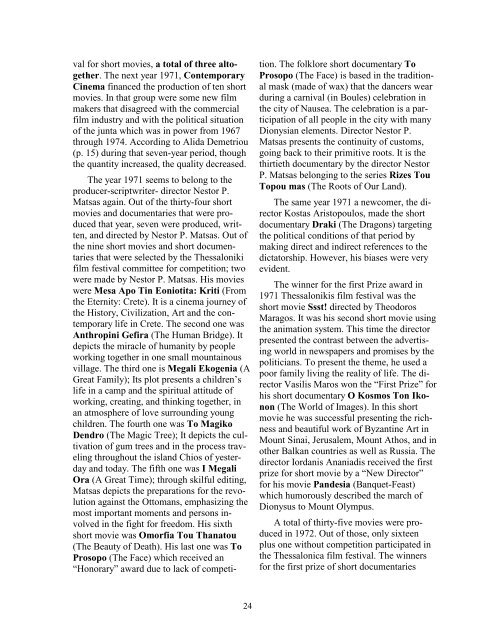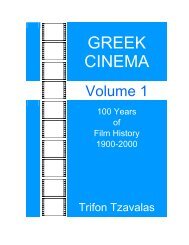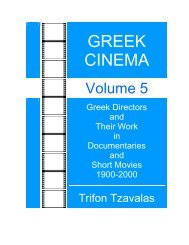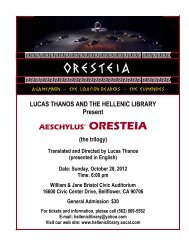- Page 1 and 2: GREEK CINEMA Volume 3 Documentaries
- Page 3: Dedicated to the memory of my paren
- Page 7: ACKNOWLEDGMENTS I would like to exp
- Page 11 and 12: It took many years for the Greek pr
- Page 13 and 14: the feature documentary Greece Tou
- Page 15 and 16: sentimental story, the leading acto
- Page 17 and 18: One more noteworthy short documenta
- Page 19 and 20: The Critics Award went to Fotis Mes
- Page 21 and 22: him, and after having conversation
- Page 23 and 24: lived in these areas for twenty-fiv
- Page 25: Director” was divided between dir
- Page 29 and 30: theater were also presented the sho
- Page 31 and 32: Its plot starts with the first anni
- Page 33: Kokkinopoulos received the fourth p
- Page 36 and 37: The director retraces the steps of
- Page 38 and 39: the life and work of a film scriptw
- Page 40 and 41: Great. The abundance of the archaeo
- Page 42 and 43: O Anthropos Pou Enohlise To Siban (
- Page 45 and 46: 1906 Olymbiaki Agones (Olympic Game
- Page 47 and 48: Kimon Spatopoulos, and Jelly Wilson
- Page 49 and 50: Karagiorgis; Director/Director of P
- Page 51 and 52: 13: Myconos (or Taxidi Sti Mykono-
- Page 53 and 54: 9: Stin Ypiresia Tou Anthropou (In
- Page 55 and 56: tor: Roussos Koundouros. (35 mm, 15
- Page 57 and 58: 6: Rababa (color); (short documenta
- Page 59 and 60: taught painter Theophilos (Theophil
- Page 61 and 62: Francis Karrabul; Director of Photo
- Page 63 and 64: Takis Kalatzis; Editor: Yannis Pana
- Page 65 and 66: Photography/Cameramen: Tasos N. Pet
- Page 67 and 68: with a strong message against immig
- Page 69 and 70: 7: Kiriaki Imera Argia (Sunday Day
- Page 71 and 72: 25: To Gazi (The Gas); (short docum
- Page 73 and 74: aphy/Cameraman: Michalis Benis; Mus
- Page 75 and 76: itor: Giorgos Tsaoulis; Starring: A
- Page 77 and 78:
Demetris Papakonstadis; Editor: Tak
- Page 79 and 80:
metris Yiannikopoulos; Music: Andre
- Page 81 and 82:
wearing a special mask called "The
- Page 83 and 84:
Antonakos; Starring: Elias Logothet
- Page 85 and 86:
24: To Krevati (The Bed); (short mo
- Page 87 and 88:
ki (Ascetics) by Nikos Kazantzakis.
- Page 89 and 90:
Director of Photography/Cameraman:
- Page 91 and 92:
persons living in a modern big city
- Page 93 and 94:
sity entrance exams, while one reti
- Page 95 and 96:
y: Profilm; Directors/Scriptwriters
- Page 97 and 98:
ing: Minas Hatzisavvas, Anneta Mich
- Page 99 and 100:
los; Editor: Spiros Provis; Histori
- Page 101 and 102:
27: 1950, Kokkini Siopi (1950, Red
- Page 103 and 104:
tor: Stefanos Hatzimichaelidis; Sta
- Page 105 and 106:
70: IL Fanfani Rapito (Fanfani Kidn
- Page 107 and 108:
Costumes: Antonis Exadaktilos; Star
- Page 109 and 110:
39: O Tromos Ke E Athliotita Tou 3r
- Page 111 and 112:
tris Metaxas. It shows a 12-year ol
- Page 113 and 114:
83: Polites (Citizens); (short movi
- Page 115 and 116:
hood festival in Drapetsona becomes
- Page 117 and 118:
40: Galazio Ke Lefko - Chimerinos T
- Page 119 and 120:
Giolekas and Markos Holefas; Music:
- Page 121 and 122:
4: E Argo Taxidevi Panda (Argo Alwa
- Page 123 and 124:
Scriptwriter: Panos Kaloudas; Direc
- Page 125 and 126:
writer: Fivos Konstantinidis; Direc
- Page 127 and 128:
71: Enas Kosmos (One World); (color
- Page 129 and 130:
tor of Photography/Cameraman: Giorg
- Page 131 and 132:
important theater director Karol’
- Page 133 and 134:
Zervoulakos; Set Designer/Costumes:
- Page 135 and 136:
Tsikra and Markos Holevas; Director
- Page 137 and 138:
lakou; Sound Recording: Panos Panou
- Page 139 and 140:
Damianos Zarifis; Sound Recording:
- Page 141 and 142:
alabos) Plaitakis; Director of Phot
- Page 143 and 144:
72: To Ethniko Theatro (The Nationa
- Page 145 and 146:
96: Porn film (color, black and whi
- Page 147 and 148:
Athanasopoulos; Narrators: Melina M
- Page 149 and 150:
Voglis. A biographical film based o
- Page 151 and 152:
Nastos; Editor: Nodas Sarlis; Sound
- Page 153 and 154:
Andreas Andreadakis; Narrator: Rini
- Page 155 and 156:
Memi Spiratou; Director of Photogra
- Page 157 and 158:
42: Peristeriones Stis Kiklades (Do
- Page 159 and 160:
toons made by 6 th grade students,
- Page 161 and 162:
two versions: First version 16 mm,
- Page 163 and 164:
Kayios, Eleftherios Kipreos and Pet
- Page 165 and 166:
Kerasidis; Director of Photography/
- Page 167 and 168:
Director/ Scriptwriter: Vasilis Kes
- Page 169 and 170:
lou; Narrator: Takis Kaberidis. A l
- Page 171 and 172:
Produced by Ministry of Education;
- Page 173 and 174:
lopoulos. A man and a woman spend t
- Page 175 and 176:
tary); Produced by Greek Film Cente
- Page 177 and 178:
15: Strofalos (Handle); (color); (s
- Page 179 and 180:
of a fictional character based on a
- Page 181 and 182:
Produced by Greek Film Center and C
- Page 183 and 184:
young man in love played between tw
- Page 185 and 186:
Movies Production; Director: Lakis
- Page 187 and 188:
Katsikaridis, Stelios Fouflias, Eli
- Page 189 and 190:
Nezeritis and Panos Kaloudas; Direc
- Page 191 and 192:
A review of the large Greek communi
- Page 193 and 194:
51: Prova (Rehearsal) (color); (sho
- Page 195 and 196:
Recording: Lambros Kourlos; Starrin
- Page 197 and 198:
of Photography/ Cameraman: Giorgos
- Page 199 and 200:
2: Paramoni Tou Sotiros (The Eve of
- Page 201 and 202:
Scriptwriter/ Texts: Armin Kerner;
- Page 203 and 204:
34: Andapodosi Tou Filellinismou (T
- Page 205 and 206:
Vorgidou, Vasiliki Damianou. The th
- Page 207 and 208:
tor of Photography/ Cameraman: Vasi
- Page 209 and 210:
Koundouros; Editor: Tasos Kakoulidi
- Page 211 and 212:
1988 1: Trimithi Anaparastasis Me L
- Page 213 and 214:
signer: Vasilis Nakos; Starring: Si
- Page 215 and 216:
Director/ Scriptwriter: Antonis Voy
- Page 217 and 218:
56: Paramoni Protohronias (New Year
- Page 219 and 220:
opoulos; Starring: X. Gioni, Antoni
- Page 221 and 222:
Cameraman: Philippas Koutsaftis and
- Page 223 and 224:
Starring: Stavros Kalos, Katerina K
- Page 225 and 226:
ianou; Music: Thomas Bakalakos. It
- Page 227 and 228:
Greek musical instruments from anci
- Page 229 and 230:
Despina Maroulakou; Music: Makis Ka
- Page 231 and 232:
Giorgos Georgiou. A documentary abo
- Page 233 and 234:
Kostas Ainian; Editor: Thomas Bodin
- Page 235 and 236:
Tonia Zisimou. A female journalist
- Page 237 and 238:
doyannis; Director of Photography/
- Page 239 and 240:
ector: Valia Petropoulou; Editor: G
- Page 241 and 242:
los; Director of Photography/Camera
- Page 243 and 244:
Tsakiroglou. About the work of scul
- Page 245 and 246:
Akis Kersanidis; Editor: Yianna Spi
- Page 247 and 248:
tonis Kokkinos; Director/Scriptwrit
- Page 249 and 250:
waste time in cafeterias and electr
- Page 251 and 252:
ing: Christos Gartaganis and Manos
- Page 253 and 254:
ten year separation and a secret be
- Page 255 and 256:
story of the kidnapping of an indus
- Page 257 and 258:
lonica 1700); (short documentary);
- Page 259 and 260:
ca); (color); (short documentary);
- Page 261 and 262:
er: Yannis Vamvakas. Sound Recordin
- Page 263 and 264:
Demetris Vithoulkas; Editor: Ioanna
- Page 265 and 266:
Katsadonis; Editor: Ioanna Paraskev
- Page 267 and 268:
valuable ring that she is about to
- Page 269 and 270:
geliki Kalahani; Sound Recording: C
- Page 271 and 272:
nikakis. The discovery of a body le
- Page 273 and 274:
Recording: Panos Papademetriou; Mus
- Page 275 and 276:
stas; Supporting Cast: Xanthi Orkop
- Page 277 and 278:
15: The Long Winter (color); (short
- Page 279 and 280:
and are afraid of the big bad world
- Page 281 and 282:
Demetris Athanitis; Director of Pho
- Page 283 and 284:
57: Nihterina Topia (Night Landscap
- Page 285 and 286:
they have to go by with is the stre
- Page 287 and 288:
90: Se Anazitisi Tou Demosiou Horou
- Page 289 and 290:
11: The Lost Spring (short document
- Page 291 and 292:
time for the parents to overlook th
- Page 293 and 294:
38: To Kouklospito (The Doll’s Ho
- Page 295 and 296:
50: Paraligo (Near Miss); (color);
- Page 297 and 298:
Viki Papapavlou, P. Chatziyannis, V
- Page 299 and 300:
Starring: Konstantinos Stamatis. In
- Page 301 and 302:
and Fotis Mitsis; Editors: Despina
- Page 303 and 304:
Photography/ Cameraman: Pavlos Mavr
- Page 305 and 306:
of Photography/Camerawoman: Katerin
- Page 307 and 308:
aphy/Cameraman: George Leurquin; Ed
- Page 309 and 310:
adaptation from the novel by Aris S
- Page 311 and 312:
Alepis; Starring: Elias Demetriou,
- Page 313 and 314:
the eyes of a two-year old. (Animat
- Page 315 and 316:
lareizi; Starring: Anna Fonsou, Min
- Page 317 and 318:
logeropoulos; Music: Pavlos Gad, De
- Page 319 and 320:
Music: Petros Toubis; Starring: Ton
- Page 321 and 322:
55: Analosis Mechri tis 12: 00 (Con
- Page 323 and 324:
68: Ke Meta Perimene Tis Epohes N
- Page 325 and 326:
84: Prin to Telos (Before the End);
- Page 327 and 328:
tor/Scriptwriter/Director of Photog
- Page 329 and 330:
it’s difficult to free her emotio
- Page 331 and 332:
30: The A-Train (color); (short doc
- Page 333 and 334:
Music: Andreas Roupas, Denis Kostop
- Page 335 and 336:
56: E Sinadisi (The Meeting); (colo
- Page 337 and 338:
70: Thelktiko Galazio; (Charming Bl
- Page 339 and 340:
Tarnanas, Maria Galiatsou, Giorgos
- Page 341 and 342:
aphy/Editor: Vasiliki Katsarou; Sta
- Page 343 and 344:
Anna Sfika and Panayiotis Saslidis;
- Page 345 and 346:
Vana Hatzoglou. An interpretation o
- Page 347 and 348:
Athina Papa, Giorgos Konstas. A soc
- Page 349 and 350:
discovers love in the riverbanks of
- Page 351 and 352:
Irene Vahlioti; Sound Recording: Af
- Page 353 and 354:
2: Sta Monopatia Tis Skepsis: Micha
- Page 355 and 356:
E.P.E; Director/Scriptwriter: Chris
- Page 357 and 358:
son, it a very boring one. (35 mm,
- Page 359 and 360:
Director: Michalis Kovanidis; Scrip
- Page 361 and 362:
aphy/Cameraman: Peter Dobson; Edito
- Page 363 and 364:
80: Birthday (color); (short movie)
- Page 365 and 366:
Giorgos Chatzikiriakos; Sound Recor
- Page 367 and 368:
los; Starring: Yannis Tsortekis, Ma
- Page 369 and 370:
tor/Scriptwriter: Keterina Patroni;
- Page 371 and 372:
her and hurts the young man. (16 mm
- Page 373 and 374:
Manos Gratsias, Sophia Koletti. A s
- Page 375 and 376:
1947 Eroiki Kriti (Heroic Crete) (s
- Page 377 and 378:
Best Short Movie: E Parastasis Teli
- Page 379 and 380:
ed in the Festivals of European Cin
- Page 381 and 382:
9: Zitima Sinitheas (A Matter of Ha
- Page 383 and 384:
1969 Short Movies, Feature and Shor
- Page 385 and 386:
6: Ta Engenia (The Opening Night);
- Page 387 and 388:
9: Ek Ton Peraton Tou Ouranou (From
- Page 389 and 390:
17: E Stigmi (The Moment); (short m
- Page 391 and 392:
7: To Xipnima Tis Anixis (Awakening
- Page 393 and 394:
9: Paraskevi Me Deftera (Friday Thr
- Page 395 and 396:
22: To Kinimatografiko Dialektiko A
- Page 397 and 398:
movie, Makarios, E Megali Poria (Ma
- Page 399 and 400:
2: Paralages Sto Idio Thema (Variat
- Page 401 and 402:
15: Zondani Ekpombi (Live Broadcast
- Page 403 and 404:
31: Betty (short movie); Director:
- Page 405 and 406:
16: Gramma Apo Ena Pedi (Letter fro
- Page 407 and 408:
25: E Teleftea Adia (The Last Leave
- Page 409 and 410:
the Balkan Film Festival, and recei
- Page 411 and 412:
2: E Lismonia (The Oblivion); (shor
- Page 413 and 414:
Best Short Experimental Movie: Sino
- Page 415 and 416:
11: Eothen (Morning); (short movie)
- Page 417 and 418:
5: 48 Ores Prin (48 Hours Before);
- Page 419 and 420:
20: Elektriko Drama (Electric Drama
- Page 421 and 422:
So Far); (short documentary); Direc
- Page 423 and 424:
8: To Plano No. 80 (The Plan No.80)
- Page 425 and 426:
12: Pathos Ekonon (Passion of Icons
- Page 427 and 428:
36: O Rolos (The Role) (short movie
- Page 429 and 430:
27: Spiral (short movie); Director:
- Page 431 and 432:
saftis; participated in the Verona
- Page 433 and 434:
23: Nihta Savvatou (Saturday Night)
- Page 435 and 436:
37: Anaplous; (Recall to Mind); (sh
- Page 437 and 438:
9: Monahiko Spor (Monastic Sport);
- Page 439 and 440:
23: Apoehe (Reverbarations); (short
- Page 441 and 442:
6: E Monahikes Ginekes Ine Epikindi
- Page 443 and 444:
52: Tou Pigemou O Fovos (Fear of Go
- Page 445 and 446:
1990 Short Movies and Documentaries
- Page 447 and 448:
9: Agonia (Agony); (short movie); D
- Page 449 and 450:
77: Sinadisi Me Anadromiki Ishi (Me
- Page 451 and 452:
ed in the Festival of Cinema School
- Page 453 and 454:
17: Lanthasmeni Apophasis (A Wrong
- Page 455 and 456:
Theodoraki received the Ministry of
- Page 457 and 458:
58: To Vivlio Tis Ammou (The Sand
- Page 459 and 460:
shared a Special Award with the mov
- Page 461 and 462:
Mediterranean Festival of New Film-
- Page 463 and 464:
19: O Lihnos (The Oil Lamp); (short
- Page 465 and 466:
8: O Aristouhos - Magna Cum Laude (
- Page 467 and 468:
32: Piase Ta Skoupidia (Take the Ga
- Page 469 and 470:
Kazantzidi; participated in the Bre
- Page 471 and 472:
28: Leptomeries (Details); (short m
- Page 473 and 474:
Category: Fiction Films 1: Ioanna S
- Page 475 and 476:
25: Eva (short documentary); Direct
- Page 477 and 478:
1998 Short Movies and Documentaries
- Page 479 and 480:
7: Ekino to Vradi (That Night); (sh
- Page 481 and 482:
1999 City of Drama Film Festival an
- Page 483 and 484:
6: E Nikifora Drasi Tis Edonis (The
- Page 485 and 486:
ipated in the Angers 1Ers Plans (Fr
- Page 487 and 488:
Samourakis; received the Second Bes
- Page 489 and 490:
3: Nifiko Yia Poulima (Wedding Dres
- Page 491 and 492:
23: Trip To Venice (short movie) Di
- Page 493 and 494:
Antouanetta Angelidi 1976: L’eau
- Page 495 and 496:
sian Orthodox Church from the Byzan
- Page 497 and 498:
Takis Touliatos 1973: Nikos Golias
- Page 499 and 500:
BIBLIOGRAPHY Aktsoglou Babis (Haral
- Page 501 and 502:
499 Trifon Tzavalas The only son of








